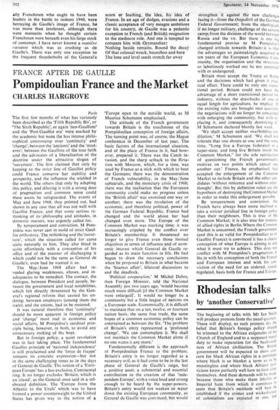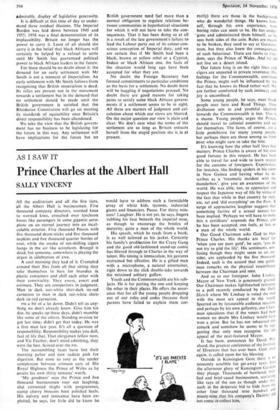Rhodesian talks
by 'another Conservative'
The beginning of talks with Mr Ian Smith will produce protests from the usual quarters. These will display, as such protests do, the belief that Britain's foreign policy should be trimmed to the African exigencies of the Church of England and to a supposed moral duty to make reparation for the backward- ness of African civilisation. The British government will be expected to show con- cern for black African rights in a continent where black is so blanket a term as to be meaningless and where black African poll' ticians know perfectly well how to look after themselves. And these demands will be made because those who make them inhabit an Imperial haze from which it continues to seem that Britain's rectitude will best be established if the crimes and wickednesses of colonialism are expiated in one, last
admirable, display of legislative generosity.
It is difficult at this time of day to under- stand these residual illusions. The Imperial Burden was laid down between 1945 and 1955; 1956 was a final demonstration of its implausibility. Britain no longer has the power to carry it. Least of all should she carry it in the belief that black Africans will certainly be helped by a refusal to settle until Mr Smith has guaranteed political power to black African leaders in the future.
For there should be no doubt about it: the demand for an early settlement with Mr Smith is not a remnant of Imperialism. An early settlement with Mr Smith follows from recognising that British imperialism is dead. Its relics are present not in the movement towards a settlement but in the demand that no settlement should be made until the British government is satisfied that the Rhodesian Constitution will go on meeting its standards of equitability once Britain's direct responsibility has been abandoned.
We take the view that the British govern- ment has no business to be legislating for the future in this way. Any settlement will have implications for the future but no British government need feel more than a normal obligation to regulate relations be- tween communities in hypothetical situations for which it will not have to take the con- sequences. That it has been doing so at all is a result of the late government's failure to lead the Labour party out of its colour-con- scious conception of Imperial duty, and we are certain that if Mr Smith had been a black, brown or yellow rebel or a Cypriot, Indian or black African one, the facts of the situation would long ago have been accepted for what they are.
No doubt the Foreign Secretary has formed commitments to particular conditions as the basis for a settlement. No doubt there will be haggling if negotiations proceed. No doubt there are good reasons for taking pains to satisfy some black African govern- ments if a settlement seems to be in sight. All these are matters of judgment and cal- culation about which our views are blurred. On the major question our view is plain and clear. We don't care what the terms of the settlement are so long as Britain extracts herself from the stupid position she is in at present.









































 Previous page
Previous page